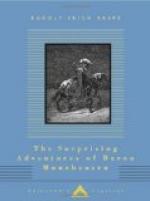The drinking at the fountain was probably an embellishment of Raspe’s own. Many of Bebel’s jests were repeated in J. P. Lange’s Delicioe Academicoe (Heilbronn, 1665), a section of which was expressly devoted to “Mendacia Ridicula”; but the yarn itself is probably much older than either. Similarly, the quaint legend of the thawing of the horn was told by Castiglione in his Cortegiano, first published in 1528. This is how Castiglione tells it: A merchant of Lucca had travelled to Poland in order to buy furs; but as there was at that time a war with Muscovy, from which country the furs were procured, the Lucchese merchant was directed to the confines of the two countries. On reaching the Borysthenes, which divided Poland and Muscovy, he found that the Muscovite traders remained on their own side of the river from distrust, on account of the state of hostilities. The Muscovites, desirous of being heard across the river announced the prices of their furs in a loud voice; but the cold was so intense that their words were frozen in the air before they could reach the opposite side. Hereupon the Poles lighted a fire in the middle of the river, which was frozen into a solid mass; and in the course of an hour the words which had been frozen up were melted, and fell gently upon the further bank, although the Muscovite traders had already gone away. The prices demanded were, however, so high that the Lucchese merchant returned without making any purchase. A similar idea is utilised by Rabelais in Pantagruel, and by Steele in one of his Tatlers. The story of the cherry tree growing out of the stag’s head, again, is given in Lange’s book, and the fact that all three tales are of great antiquity is proved by the appearance of counterparts to them in Lady Guest’s edition of the Mabinogion. A great number of nugoe canoroe of a perfectly similar type are narrated in the sixteenth century “Travels of the Finkenritter” attributed to Lorenz von Lauterbach.
To humorous waifs of this description, without fixed origin or birthplace, did Raspe give a classical setting amongst embroidered versions of the baron’s sporting jokes. The unscrupulous manner in which he affixed Munchausen’s own name to the completed jeu d’esprit is, ethically speaking, the least pardonable of his crimes; for when Raspe’s little book was first transformed and enlarged, and then translated into German, the genial old baron found himself the victim of an unmerciful caricature, and without a rag of concealment. It is consequently not surprising to hear that he became soured and reticent before his death at Bodenwerder in 1797.
Strangers had already begun to come down to the place in the hope of getting a glimpse of the eccentric nobleman, and foolish stories were told of his thundering out his lies with apoplectic visage, his eyes starting out of his head, and perspiration beading his forehead. The fountain of his reminiscences was in reality quite dried up, and it must be admitted that this excellent old man had only too good reason to consider himself an injured person.




